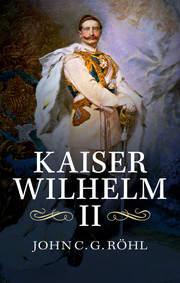Book contents
- Frontmatter
- Dedication
- Contents
- List of figures
- Acknowledgements
- Preface to the English edition
- Preface to the German edition
- Acknowledgements
- Overview: Wilhelm the Last, a German trauma
- Part I 1859–1888: The Tormented Prussian Prince
- Part II 1888–1909: The Anachronistic Autocrat
- 6 Divine right without end
- 7 Bismarck’s fall from power (1889–1890)
- 8 The establishment of the Kaiser’s personal monarchy (1890–1897)
- 9 The Chancellor as courtier: the corrupt Bülow system (1897–1909)
- Part III 1896–1908: The Egregious Expansionist
- Part IV 1906–1909: The Scandal-Ridden Sovereign
- Part V 1908–1914: The Bellicose Supreme War Lord
- Part VI 1914–1918: The Champion of God’s Germanic Cause
- Part VII 1918–1941: The Vengeful Exile
- Notes
- Index
6 - Divine right without end
Published online by Cambridge University Press: 05 September 2014
- Frontmatter
- Dedication
- Contents
- List of figures
- Acknowledgements
- Preface to the English edition
- Preface to the German edition
- Acknowledgements
- Overview: Wilhelm the Last, a German trauma
- Part I 1859–1888: The Tormented Prussian Prince
- Part II 1888–1909: The Anachronistic Autocrat
- 6 Divine right without end
- 7 Bismarck’s fall from power (1889–1890)
- 8 The establishment of the Kaiser’s personal monarchy (1890–1897)
- 9 The Chancellor as courtier: the corrupt Bülow system (1897–1909)
- Part III 1896–1908: The Egregious Expansionist
- Part IV 1906–1909: The Scandal-Ridden Sovereign
- Part V 1908–1914: The Bellicose Supreme War Lord
- Part VI 1914–1918: The Champion of God’s Germanic Cause
- Part VII 1918–1941: The Vengeful Exile
- Notes
- Index
Summary
For contemporaries, the transition from the ninety-year-old Kaiser Wilhelm I to his twenty-nine-year-old grandson Wilhelm II seemed like jumping a generation. Ideologically, however, the Year of the Three Kaisers was more a matter of leaping a chasm of centuries. It is true that the Empress Frederick, as Victoria now asked to be known, with her almost republican convictions, was in many respects far in advance of her time; she could never have gained acceptance for her ideas in the system of ‘personal monarchy’, which, thanks to Bismarck, was once again firmly entrenched in Germany (and Prussia in particular). Yet the conception of the divine monarchical principle that the young Wilhelm had absorbed, not least as a counterweight to his parents’ liberal ideals, belonged to the eighteenth century, to the era before the Enlightenment, the French Revolution and Napoleon. Although Bismarck had prided himself on preserving the Hohenzollern monarchy from the clutches of parliamentarianism and preventing it from degenerating – as in Britain, Italy, Scandinavia, the Netherlands and Belgium – into an ‘automatic signing machine’, he was compelled to realise, soon after the double change of sovereign in 1888, that by keeping alive the ‘monarchical principle’ he had put an axe to the roots not only of his own position of power but also of the entire Reich structure he had built up. By ignoring the constitutional aspirations and the centuries-old experience of Europe, he had opened the door to arbitrary rule, sycophantic favouritism and strutting militarism at the court of the Hohenzollerns. If ‘personal monarchy’ was no more than a legal fiction in Bismarck’s eyes, Wilhelm II took it literally and regarded the monarchical principle of divine right as legitimising his autocracy.
- Type
- Chapter
- Information
- Kaiser Wilhelm IIA Concise Life, pp. 41 - 43Publisher: Cambridge University PressPrint publication year: 2014



